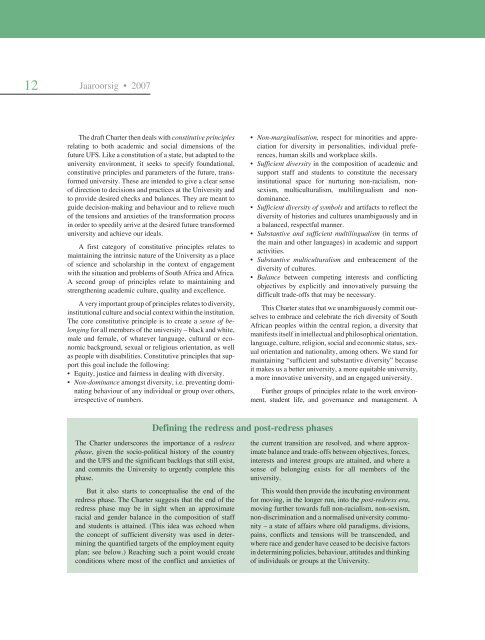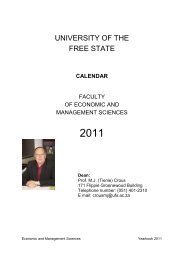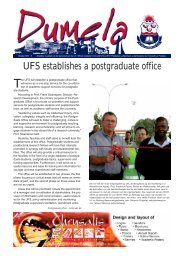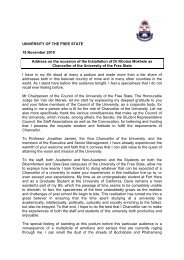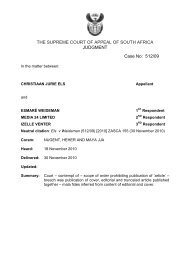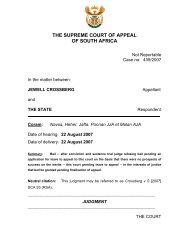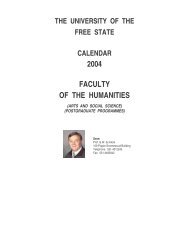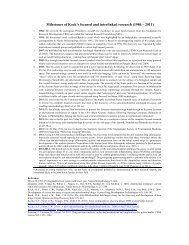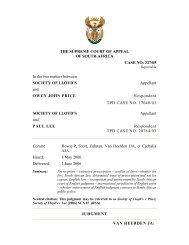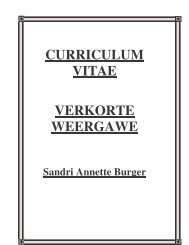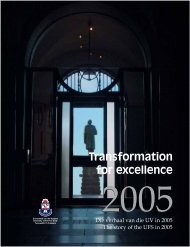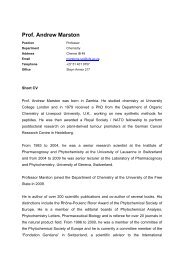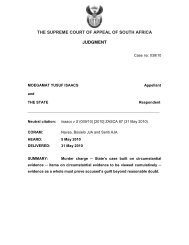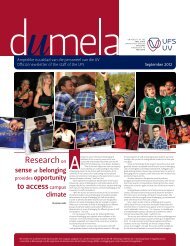UV Jaaroorsig - University of the Free State
UV Jaaroorsig - University of the Free State
UV Jaaroorsig - University of the Free State
Create successful ePaper yourself
Turn your PDF publications into a flip-book with our unique Google optimized e-Paper software.
12<br />
<strong>Jaaroorsig</strong> • 2007<br />
The draft Charter <strong>the</strong>n deals with constitutive principles<br />
relating to both academic and social dimensions <strong>of</strong> <strong>the</strong><br />
future UFS. Like a constitution <strong>of</strong> a state, but adapted to <strong>the</strong><br />
university environment, it seeks to specify founda tional,<br />
constitutive principles and parameters <strong>of</strong> <strong>the</strong> future, transformed<br />
university. These are intended to give a clear sense<br />
<strong>of</strong> direction to decisions and practices at <strong>the</strong> <strong>University</strong> and<br />
to provide desired checks and balances. They are meant to<br />
guide decision-making and behaviour and to relieve much<br />
<strong>of</strong> <strong>the</strong> tensions and anxieties <strong>of</strong> <strong>the</strong> transformation process<br />
in order to speedily arrive at <strong>the</strong> desired future transformed<br />
university and achieve our ideals.<br />
A first category <strong>of</strong> constitutive principles relates to<br />
main taining <strong>the</strong> intrinsic nature <strong>of</strong> <strong>the</strong> <strong>University</strong> as a place<br />
<strong>of</strong> science and scholarship in <strong>the</strong> context <strong>of</strong> engagement<br />
with <strong>the</strong> situation and problems <strong>of</strong> South Africa and Africa.<br />
A second group <strong>of</strong> principles relate to maintaining and<br />
streng<strong>the</strong>ning academic culture, quality and excellence.<br />
A very important group <strong>of</strong> principles relates to diversity,<br />
institutional culture and social context within <strong>the</strong> institution.<br />
The core constitutive principle is to create a sense <strong>of</strong> belonging<br />
for all members <strong>of</strong> <strong>the</strong> university – black and white,<br />
male and female, <strong>of</strong> whatever language, cultural or economic<br />
background, sexual or religious orientation, as well<br />
as people with disabilities. Constitutive principles that support<br />
this goal include <strong>the</strong> following:<br />
• Equity, justice and fairness in dealing with diversity.<br />
• Non-dominance amongst diversity, i.e. preventing dominating<br />
behaviour <strong>of</strong> any individual or group over o<strong>the</strong>rs,<br />
irrespective <strong>of</strong> numbers.<br />
The Charter underscores <strong>the</strong> importance <strong>of</strong> a redress<br />
phase, given <strong>the</strong> socio-political history <strong>of</strong> <strong>the</strong> country<br />
and <strong>the</strong> UFS and <strong>the</strong> significant backlogs that still exist,<br />
and commits <strong>the</strong> <strong>University</strong> to urgently complete this<br />
phase.<br />
But it also starts to conceptualise <strong>the</strong> end <strong>of</strong> <strong>the</strong><br />
redress phase. The Charter suggests that <strong>the</strong> end <strong>of</strong> <strong>the</strong><br />
redress phase may be in sight when an ap pro ximate<br />
racial and gender balance in <strong>the</strong> composition <strong>of</strong> staff<br />
and students is attained. (This idea was echoed when<br />
<strong>the</strong> concept <strong>of</strong> sufficient diversity was used in de termining<br />
<strong>the</strong> quantified targets <strong>of</strong> <strong>the</strong> employ ment equity<br />
plan; see below.) Reaching such a point would create<br />
condi tions where most <strong>of</strong> <strong>the</strong> conflict and anxieties <strong>of</strong><br />
• Non-marginalisation, respect for minorities and ap preciation<br />
for diversity in personalities, individual pre ferences,<br />
human skills and workplace skills.<br />
• Sufficient diversity in <strong>the</strong> composition <strong>of</strong> academic and<br />
support staff and students to constitute <strong>the</strong> neces sary<br />
institutional space for nurturing non-racialism, nonsexism,<br />
multi culturalism, multilingualism and nondominance.<br />
• Sufficient diversity <strong>of</strong> symbols and artifacts to reflect <strong>the</strong><br />
diversity <strong>of</strong> histories and cultures unambiguously and in<br />
a balanced, respectful manner.<br />
• Substantive and sufficient multilingualism (in terms <strong>of</strong><br />
<strong>the</strong> main and o<strong>the</strong>r languages) in academic and support<br />
activities.<br />
• Substantive multiculturalism and embracement <strong>of</strong> <strong>the</strong><br />
diversity <strong>of</strong> cultures.<br />
• Balance between competing interests and conflicting<br />
objectives by explicitly and innovatively pursuing <strong>the</strong><br />
difficult trade-<strong>of</strong>fs that may be necessary.<br />
This Charter states that we unambiguously commit ourselves<br />
to embrace and celebrate <strong>the</strong> rich diversity <strong>of</strong> South<br />
African peoples within <strong>the</strong> central region, a diversity that<br />
manifests itself in intellectual and philosophical orientation,<br />
language, culture, religion, social and economic status, sexual<br />
orientation and nationality, among o<strong>the</strong>rs. We stand for<br />
maintaining “sufficient and substantive diversity” because<br />
it makes us a better university, a more equitable university,<br />
a more innovative university, and an engaged university.<br />
Fur<strong>the</strong>r groups <strong>of</strong> principles relate to <strong>the</strong> work en vi ronment,<br />
student life, and governance and management. A<br />
Defining <strong>the</strong> redress and post-redress phases<br />
<strong>the</strong> current transition are resolved, and where approximate<br />
balance and trade-<strong>of</strong>fs between objectives, forces,<br />
interests and interest groups are attained, and where a<br />
sense <strong>of</strong> belonging exists for all members <strong>of</strong> <strong>the</strong><br />
university.<br />
This would <strong>the</strong>n provide <strong>the</strong> incubating environment<br />
for moving, in <strong>the</strong> longer run, into <strong>the</strong> post-redress era,<br />
moving fur<strong>the</strong>r towards full non-racialism, non-sexism,<br />
non-discrimination and a normalised university com munity<br />
– a state <strong>of</strong> affairs where old paradigms, divisions,<br />
pains, conflicts and tensions will be transcended, and<br />
where race and gender have ceased to be decisive factors<br />
in determining policies, behaviour, attitudes and thinking<br />
<strong>of</strong> individuals or groups at <strong>the</strong> <strong>University</strong>.


